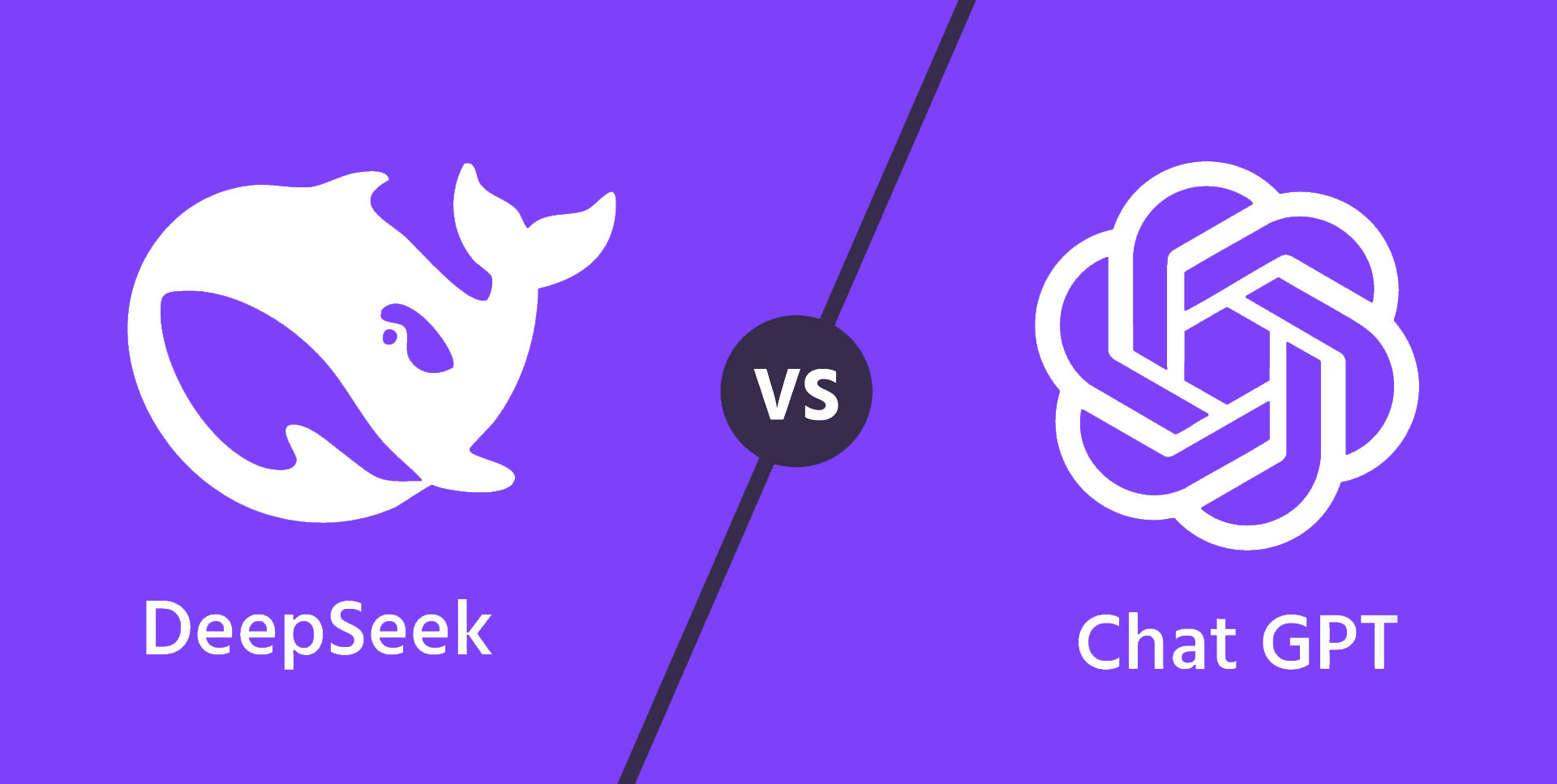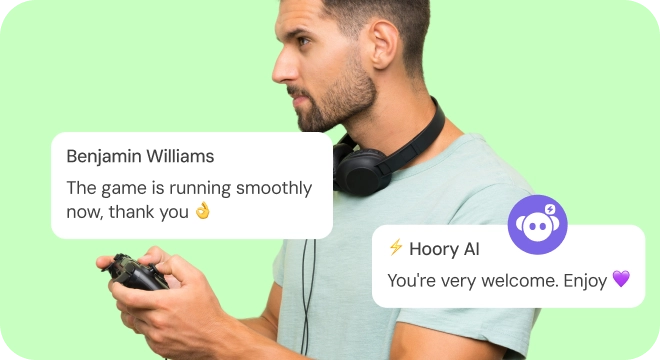DeepSeek vs ChatGPT: A Battle of AI Giants
• Customer Support
• FastBank

AI chatbots have become our everyday companions, assisting us with work, learning, and even entertainment. ChatGPT, in particular, has been a go-to for many, but now DeepSeek is stepping into the ring with its unique take on conversational AI.
What is DeepSeek? If you're not deep into the tech world, you might be wondering. To satisfy your curiosity, here's a simple answer - it's a relatively new yet promising AI model, somewhat like OpenAI's ChatGPT but its own unique approach to conversational AI.
With both of these AI models fighting for the spotlight, it's time to put them to the test in this DeepSeek vs ChatGPT showdown to see which one does it better. Does DeepSeek bring something new to the table, or does ChatGPT still reign supreme? Let's dive in and find out together.
Is DeepSeek Better Than ChatGPT?
Although DeepSeek and ChatGPT are both large language models, therefore may seem similar at first glance, they come from different backgrounds and take unique approaches to AI-powered conversations. Let’s take a closer look:
What is DeepSeek? Meet The Open-Source Challenger
DeepSeek is a newer chatbot developed by a Chinese research team. DeepSeek Artificial Intelligence Co., Ltd. was founded in 2023 in response to the growing demand for advanced AI systems and accessible Artificial General Intelligence (AGI).
Unlike ChatGPT, DeepSeek is an open-source system, meaning that developers can freely customize it. So, it offers more flexibility for businesses to fine-tune their own AI models. It has adopted the so-called Mixture-of-Experts (MoE) approach, which essentially means having a group of top-notch experts only the most relevant of whom are called upon for each task.
Technically spoken, it has 671 billion parameters or knowledge points, and DeepSeek utilizes only a small portion of those to complete each request.
ChatGPT: OpenAI's AI Artillery
ChatGPT, developed in November of 2022 by OpenAI, has been around for a longer period of time and is widely recognized and used as a powerful AI chatbot.
In early 2023, ChatGPT was integrated into Hoory AI's support service as a new addition. Since then, the AI landscape has evolved, and ChatGPT is no longer the sole leader. Today, it faces competition from engaging players like DeepSeek, which are carving out their own niches in AI-driven solutions.
Unlike DeepSeek, however, ChatGPT is a proprietary model, which means OpenAI controls its updates, features, and accessibility.
As for the main application of Generative AI, ChatGPT runs the traditional transformer model, which, in contrast to DeepSeek, means having a group of skilled experts and assigning every task to all of them.
While both of these large language models aim to provide smart, human-like interactions, their core differences - open-source vs proprietary, customization vs convenience - set them apart.
Now that we know where these two AI chatbots come from, let's talk about how they actually perform.
Key Differences Between DeepSeek and ChatGPT
1. Natural Language Processing: How Well They Understand and Respond
Both chatbots have Natural Language Processing (NLP) at the core of their structure, which supports the ability to have genuine, human-like conversations, however they still shine in different ways.
-
DeepSeek, on the other hand, focuses on precision. It's good at logic-heavy responses, making it a good choice for technical or research-based questions. It particularly excels in mathematics where it achieves an impressive 90% accuracy date - significantly higher than many competitors.
-
ChatGPT is creative and great at keeping conversations flowing. It understands context well and can mimic different writing styles. It is specifically skilled at providing more nuanced and well-rounded responses over a broad range of topics.
2. Training Data: What Each Model Is Trained On?
The performance of AI chatbots largely depends on the data they learn from. The kind of information they are trained on determines how well they understand questions and contexts and generate responses across diverse topics.
-
DeepSeek is also trained on a large dataset, however it has a more highlighted focus on multilingual text and structured reasoning tasks. Since it's open-source, developers can see and modify the training process, aligning it with use-case or industry specific goals. DeepSeek aims for accuracy and logic, which makes it a strong tool for research and technical discussions. Although there is no indication on the exact cut-off date of its knowledge base, its open-source nature makes it possible to continuously update it with more recent information.
-
ChatGPT is trained on a massive mix of text from books, websites, and online conversations. That's what enables it to handle questions on different topics. OpenAI actually doesn't share many details about its training data, but what's evident is that ChatGPT, specifically versions based on GPT-3 and GPT-4, was trained on data up until September 2021. It means that it can generate responses on a vast amount of information up until that point, however it doesn't have access to events and updates that happened after that date, unless OpenAI specifically updated it. Also, conversations with ChatGPT are devoid of harmful and sensitive content and misinformation.
3. User Experience & Customization
-
DeepSeek, on the other hand, is designed for the use of those who need a more specialized AI experience, especially users working with Chinese-language content. It caters to the nuances of Mandarin and related linguistic contexts, supporting region-specific queries. However, non-Chinese users may find it a bit restrictive, especially if they require a broader, multilingual conversational AI assistant.
-
ChatGPT is designed for a broader user base compared to DeepSeek. It has a clean and user-friendly interface, which makes it easy to navigate as a first-time user. It provides a balanced mix of structured and creative responses, making it a handy tool for a wide range of applications. However, when it comes to customization, ChatGPT is limited compared to open-source models. Businesses can certainly customize it through API settings but nowhere is it near to the freedom and flexibility of open-source options.
4. Ethical Considerations & Limitations
-
DeepSeek, on the other hand, may raise concerns due to its data storage practices, particularly for projects involving sensitive information. According to BBC research on DeepSeek's potential and technical power, its privacy policy states that large amounts of data are collected from users and kept in Chinese "secure servers." This data includes email addresses, dates of birth, phone numbers, chat histories, phone models, IP addresses, and potentially a lot more that is not explicitly announced unless you bother to read their privacy policy. Then, this information can be shared with corporate groups, service providers, business and advertising partners, and service providers and can be kept for "as long as necessary."
-
ChatGPT follows Western data protection protocols, making it a more reliable tool for projects that need strict privacy compliance. Its approach to data security aligns with established industry standards, making it a safe choice for businesses and organizations that handle sensitive information. This is particularly important in fields like healthcare, finance, and law, where strong data protection measures and confidentiality are highly significant.
5. Pricing
Another key aspect to consider when comparing DeepSeek and ChatGPT is, of course, pricing. Below is a detailed breakdown of each of their pricing models, including subscription plans, usage limits, and additional costs.
Performance in Various Use Cases
When it comes to content creation, ChatGPT is widely used for writing articles, marketing copy, and creative storytelling thanks to its ability to generate coherent and engaging text. DeepSeek performs well in generating Chinese-language content but may not compete with ChatGPT's versatility in English and other global languages. Here's the result of an experimentative interaction we had with both of these models.
To the broad question, "What is DeepSeek?" DeepSeek gives a one-sentence vague answer without elaborating, while to the same question, ChatGPT provides an extensive four-paragraph-long explanation, along with relevant links to web sources highlighting DeepSeek's impact on the AI industry. Check it out yourself:
DeepSeek's Answer
ChatGPT's Answer
For business and professional applications, such as customer support, report drafting, and internal communications, ChatGPT's API offers seamless integration into workflows, making it a reliable AI assistant. In fact, GPT-4o is one of the main LLM options you can choose from when creating an AI assistant on Hoory AI. DeepSeek, however, is better suited for businesses operating primarily in Chinese markets, where it can provide more region-tailored responses and, thus, more relevant assistance.
For research and fact-based inquiries, both AI models have limitations due to time-bound knowledge bases, meaning they may not always provide the most up-to-date information. Since they rely on pre-existing data rather than real-time internet access, their responses can sometimes be outdated or lack recent developments in technology, science, and current events.
For general coding tasks, debugging, and algorithm design, ChatGPT (especially with GPT-4) is typically the better option due to its versatility and large training data. For highly specialized coding or data-heavy logical tasks, DeepSeek may offer an advantage thanks to its MoE architecture, which can allocate resources more efficiently.
DeepSeek vs ChatGPT: Which AI Model Should You Choose?
When it comes to choosing a side in the DeepSeek vs ChatGPT battle, the right choice depends on what you need from an AI model. Both are powerful, but they excel in different areas.
The key difference between DeepSeek and ChatGPT lies in how they process information. DeepSeek leverages MoE to direct resources where they're needed most, while ChatGPT takes a more generalized approach, making it a versatile choice for everyday users.
So, which AI model should you choose? If you need precision and multilingual depth, DeepSeek is a strong option. If you want a well-rounded AI for creative and conversational tasks, ChatGPT is the AI model you should go for.
With that being said, keep in mind that AI is evolving rapidly, and both AI models continue to improve. Features that set them apart today may change as updates roll out. The best way to decide? Try both and see which fits your needs best - you might even find that using them together gives you the ultimate AI experience.
To Conclude
AI isn't about choosing sides - it's about finding the right tool to get the job done. Whether you need DeepSeek's MoE-powered features for complex tasks or ChatGPT's conversational ease, both have their place in the AI landscape.
The difference between DeepSeek and ChatGPT highlights how diverse AI models have become, catering to needs and preferences. Instead of looking for a single winner, think about how each can enhance your workflow.
Technology moves fast, and AI is no exception. The best choice today might evolve and change tomorrow, so why limit yourself? Stay curious, explore both, and make AI work for you.

























